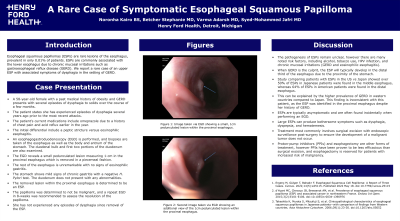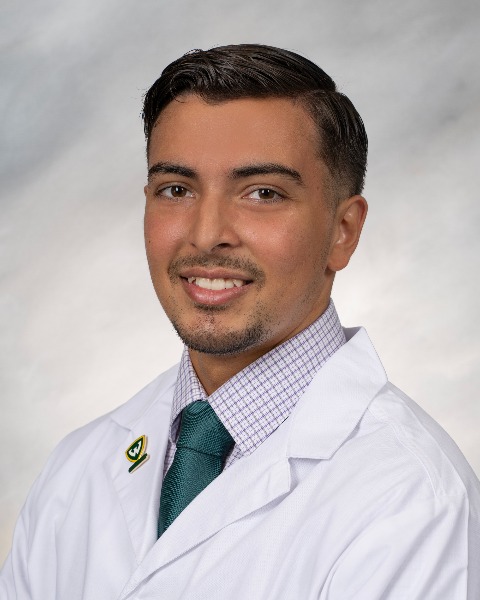Tuesday Poster Session
Category: Esophagus
P4032 - A Rare Case of Symptomatic Esophageal Squamous Papilloma
Tuesday, October 29, 2024
10:30 AM - 4:00 PM ET
Location: Exhibit Hall E

Has Audio

Kairo Noronha, BS
Wayne State School of Medicine
Detroit, MI
Presenting Author(s)
Kairo Noronha, BS1, Stephanie Betcher, MD2, Adarsh K. Varma, MD3, Syed-Mohammed Jafri, MD3
1Wayne State School of Medicine, Detroit, MI; 2Henry Ford Health, Royal Oak, MI; 3Henry Ford Health, Detroit, MI
Introduction: Esophageal squamous papillomas (ESPs) are rare lesions of the esophagus, prevalent in only 0.01% of patients. ESPs are commonly associated with the lower esophagus due to chronic mucosal irritations such as gastroesophageal reflux disease (GERD). We report a rare case of an upper ESP with associated symptoms of dysphagia in the setting of GERD.
Case Description/Methods: A 58-year-old female patient with a history of GERD presented to the clinic with two episodes of dysphagia over the course of a few months. She stated a history of dysphagia several years ago prior to the most recent attacks. She also experienced chest pain earlier in the year, attributed to acid reflux for which she was previously prescribed omeprazole daily. The initial differential included a peptic stricture versus eosinophilic esophagitis, and she was recommended to undergo an esophagogastroduodenoscopy (EGD) with biopsies of the esophagus as well as the body and antrum of the stomach. The duodenal bulb and first two portions of the duodenum were also to be examined. While performing the EGD, a small pedunculated lesion measuring 1-cm was noted in the proximal esophagus which was removed in a piecemeal fashion. The rest of the esophagus was unremarkable with no signs of eosinophilic esophagitis. Biopsies of the stomach were normal, showing only mild signs of chronic gastritis. A test for the presence of H. pylori was ordered, and it returned negative. The duodenum also did not present with any abnormalities. The removed lesion within the proximal esophagus was determined to be an esophageal squamous papilloma (ESP). The papilloma was said to not be malignant, and a repeat EGD in 8-weeks was recommended to assess the resolution of the papilloma. She has not experienced any episodes of dysphagia since removal of the ESP.
Discussion: ESPs are rare, often benign lesions of the epithelia of the esophagus. The pathogenesis of ESPs remains uncertain, but there are many noted risk factors to their development, one being mucosal irritations such as GERD. If GERD is the cause of the ESP, the ESP will typically develop in the distal third of the esophagus due to its close proximity to the stomach. ESPs are commonly found incidentally when performing an EGD due to their asymptomatic nature. Larger ESPs can produce bothersome symptoms such as dysphagia. In most cases, the appropriate choice of treatment is surgical excision of the lesion followed by endoscopic surveillance to ensure the development of a malignant tumor does not occur.
Disclosures:
Kairo Noronha, BS1, Stephanie Betcher, MD2, Adarsh K. Varma, MD3, Syed-Mohammed Jafri, MD3. P4032 - A Rare Case of Symptomatic Esophageal Squamous Papilloma, ACG 2024 Annual Scientific Meeting Abstracts. Philadelphia, PA: American College of Gastroenterology.
1Wayne State School of Medicine, Detroit, MI; 2Henry Ford Health, Royal Oak, MI; 3Henry Ford Health, Detroit, MI
Introduction: Esophageal squamous papillomas (ESPs) are rare lesions of the esophagus, prevalent in only 0.01% of patients. ESPs are commonly associated with the lower esophagus due to chronic mucosal irritations such as gastroesophageal reflux disease (GERD). We report a rare case of an upper ESP with associated symptoms of dysphagia in the setting of GERD.
Case Description/Methods: A 58-year-old female patient with a history of GERD presented to the clinic with two episodes of dysphagia over the course of a few months. She stated a history of dysphagia several years ago prior to the most recent attacks. She also experienced chest pain earlier in the year, attributed to acid reflux for which she was previously prescribed omeprazole daily. The initial differential included a peptic stricture versus eosinophilic esophagitis, and she was recommended to undergo an esophagogastroduodenoscopy (EGD) with biopsies of the esophagus as well as the body and antrum of the stomach. The duodenal bulb and first two portions of the duodenum were also to be examined. While performing the EGD, a small pedunculated lesion measuring 1-cm was noted in the proximal esophagus which was removed in a piecemeal fashion. The rest of the esophagus was unremarkable with no signs of eosinophilic esophagitis. Biopsies of the stomach were normal, showing only mild signs of chronic gastritis. A test for the presence of H. pylori was ordered, and it returned negative. The duodenum also did not present with any abnormalities. The removed lesion within the proximal esophagus was determined to be an esophageal squamous papilloma (ESP). The papilloma was said to not be malignant, and a repeat EGD in 8-weeks was recommended to assess the resolution of the papilloma. She has not experienced any episodes of dysphagia since removal of the ESP.
Discussion: ESPs are rare, often benign lesions of the epithelia of the esophagus. The pathogenesis of ESPs remains uncertain, but there are many noted risk factors to their development, one being mucosal irritations such as GERD. If GERD is the cause of the ESP, the ESP will typically develop in the distal third of the esophagus due to its close proximity to the stomach. ESPs are commonly found incidentally when performing an EGD due to their asymptomatic nature. Larger ESPs can produce bothersome symptoms such as dysphagia. In most cases, the appropriate choice of treatment is surgical excision of the lesion followed by endoscopic surveillance to ensure the development of a malignant tumor does not occur.
Disclosures:
Kairo Noronha indicated no relevant financial relationships.
Stephanie Betcher indicated no relevant financial relationships.
Adarsh Varma indicated no relevant financial relationships.
Syed-Mohammed Jafri: Gilead, Takeda, Abbvie, Intercept, VectivBio – Advisor or Review Panel Member, Speakers Bureau.
Kairo Noronha, BS1, Stephanie Betcher, MD2, Adarsh K. Varma, MD3, Syed-Mohammed Jafri, MD3. P4032 - A Rare Case of Symptomatic Esophageal Squamous Papilloma, ACG 2024 Annual Scientific Meeting Abstracts. Philadelphia, PA: American College of Gastroenterology.
